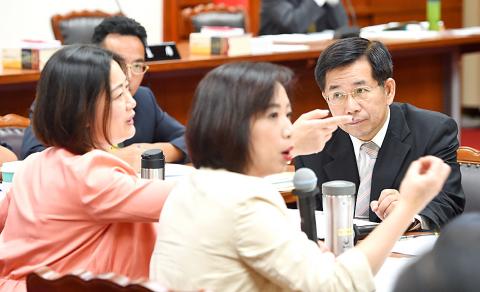Foreigners planning to work for cram schools as language teachers are to be required to provide documents issued by their home countries guaranteeing good conduct, the Ministry of Education said yesterday.
Department of Lifelong Education Director Huang Yueh-li (黃月麗) said the ministry has submitted a proposed amendment to the Supplementary Education Act (補習及進修教育法) to the legislature for review.
The Education and Culture Committee yesterday approved the draft amendment to Article 9 of the act that would tighten regulations on cram-school teachers to ensure the safety of students.

Photo: Liu Hsin-de, Taipei Times
If passed, the amendment would require first-time applicants for teaching jobs at private institutions to provide documents proving that they had demonstrated good conduct prior to entering the nation.
While the information in the documents may vary from one nation to another, it should be able to prove that applicants have not committed any crimes within a certain period before they are allowed to enter the nation and begin the interview process, Huang said.
Cram schools are to be required to submit the documents to the Ministry of Labor for review, she said, adding that rules governing foreign teachers’ entry and employment would have to be amended.
Taiwan would not the first nation to require expatriates to provide records documenting good behavior when they apply for teaching posts, as other Asian nations, such as Japan and South Korea, have adopted similar policies, she said.
The rule change would not affect foreigners who are already working as teachers at private institutes, who are required to provide Police Criminal Record Certificates issued by the Ministry of the Interior showing that they have not committed any criminal offenses in Taiwan in the three months prior to their employment, she said.
Chinese Nationalist Party (KMT) Legislator Ko Chih-en (柯志恩), who is the convener of the committee, said that foreigners in other lines of work who want to pursue a teaching career would also need to request documents guaranteeing good conduct from the authorities in their home nation.
Ko said she hoped the draft would pass the second and third readings this legislative session.
The draft amendment also includes a penalty of NT$50,000 for institutes that fail to report cases of sexual harassment or assault perpetrated by their employees.
The ministry proposed the amendment amid widespread controversy over the suicide of author Lin Yi-han (林奕含) last month, allegedly due to the trauma she sustained after being raped by a cram-school teacher when she was 17.

DAREDEVIL: Honnold said it had always been a dream of his to climb Taipei 101, while a Netflix producer said the skyscraper was ‘a real icon of this country’ US climber Alex Honnold yesterday took on Taiwan’s tallest building, becoming the first person to scale Taipei 101 without a rope, harness or safety net. Hundreds of spectators gathered at the base of the 101-story skyscraper to watch Honnold, 40, embark on his daredevil feat, which was also broadcast live on Netflix. Dressed in a red T-shirt and yellow custom-made climbing shoes, Honnold swiftly moved up the southeast face of the glass and steel building. At one point, he stepped onto a platform midway up to wave down at fans and onlookers who were taking photos. People watching from inside

A Vietnamese migrant worker yesterday won NT$12 million (US$379,627) on a Lunar New Year scratch card in Kaohsiung as part of Taiwan Lottery Co’s (台灣彩券) “NT$12 Million Grand Fortune” (1200萬大吉利) game. The man was the first top-prize winner of the new game launched on Jan. 6 to mark the Lunar New Year. Three Vietnamese migrant workers visited a Taiwan Lottery shop on Xinyue Street in Kaohsiung’s Gangshan District (崗山), a store representative said. The player bought multiple tickets and, after winning nothing, held the final lottery ticket in one hand and rubbed the store’s statue of the Maitreya Buddha’s belly with the other,

‘COMMITTED TO DETERRENCE’: Washington would stand by its allies, but it can only help as much as countries help themselves, Raymond Greene said The US is committed to deterrence in the first island chain, but it should not bear the burden alone, as “freedom is not free,” American Institute in Taiwan Director Raymond Greene said in a speech at the Institute for National Defense and Security Research’s “Strengthening Resilience: Defense as the Engine of Development” seminar in Taipei yesterday. In the speech, titled “Investing Together and a Secure and Prosperous Future,” Greene highlighted the contributions of US President Donald Trump’s administration to Taiwan’s defense efforts, including the establishment of supply chains for drones and autonomous systems, offers of security assistance and the expansion of

STREAMLINED: The dedicated funding would allow the US to transfer equipment to Taiwan when needed and order upgraded replacements for stockpiles, a source said The US House of Representatives on Thursday passed a defense appropriations bill totaling US$838.7 billion, of which US$1 billion is to be allocated to reinforcing security cooperation with Taiwan and US$150 million to replace defense articles provided to the nation. These are part of the Consolidated Appropriation Act, which the US House yesterday passed with 341 votes in favor and 88 against. The act must be passed by the US Senate before Friday next week to avoid another government shutdown. The US House Committee on Appropriations on Monday unveiled the act, saying that it allocates US$1 billion for the Taiwan Security Cooperation Initiative